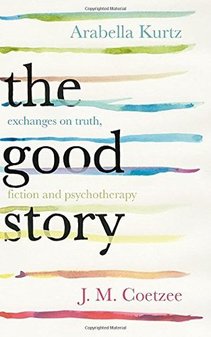| I’ve mentioned before that I think novelists and psychotherapists are in a similar business, yet the fictional therapists we encounter on the page sometimes fail to convince. So what better way for the writer bent on creating a credible fictional therapist than to eavesdrop on a conversation between a winner of the Nobel Prize for Literature and a clinical psychologist, lecturer and psychoanalytic psychotherapist? As JM Coetzee and Arabella Kurtz toss ideas back and forth about the intersection between truth, story and morality, the writer is afforded a remarkable insight into the workings of the therapist’s mind. |
Coetzee’s interrogation of the ideals and fictions of therapy is thoughtful, persistent and respectful. Yet his contribution came across to me as that of a generic intellectual, rather than as one of anti-apartheid most distinguished white writers. Coming to this shortly after rereading his novel Disgrace for my reading group, I jotted down the title in the margin at a couple of points but, although a few of his other novels are referenced in passing, I found no mention of Disgrace in the text, nor South Africa’s Truth and Reconciliation Commission which it is said to allegorise. I suspect this omission is attributable more to Coetzee’s famed reticence than a lack of curiosity on the part of his co-author. Another gap from my point of view was that, while the relational truth constructed between therapist and patient was repeatedly acknowledged, the coupling of reader and writer in the creation of a good novel was barely explored.
Overall, The Good Story is a thought-provoking and highly readable examination of the story of psychoanalytic therapy, addressed to the literary and philosophically inclined. Published by Harvill Secker, I was given a copy by Arabella Kurtz, a former colleague with whom I have had the pleasure of teaching clinical psychology trainees over a number of years. For that reason, and because I rarely read non-fiction, I’m not claiming this as a proper review but as reflections on my reading that might be of interest to some readers of this blog.
It also might be of interest to a writer like Siri Hustvedt who presents a psychotherapist’s take on truth in her novel, The Sorrows of an American (p86):
There is no clear border between remembering and imagining. When I listen to a patient, I am not reconstructing the “facts” of a case history but listening for patterns, strains of feeling, and associations that may move us out of painful repetitions and into an articulated understanding … we make our narratives, and those created stories can’t be separated from the culture in which we live. There are times, however when fantasy, delusion, or outright lies parade as autobiography, and it’s necessary to make some nominal distinction between fact and fiction. Doubt is an uncomfortable feeling that can quickly become suspicion, and under the intimate circumstances of psychotherapy, it may be nothing short of dangerous.
This book also got me thinking about my distaste for cosy fiction; it’s not that I want to be made miserable, but the overly cheerful seems a denial of my own truth. What’s your view on the role of truth in the good story you tell yourself?






















 RSS Feed
RSS Feed





















